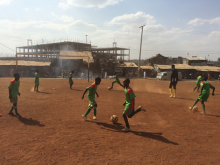Play It Forward: The Untapped Potential of Sport to Accelerate Global Progress towards Gender Equity
Girls are born leaders. What they lack, almost universally, is an equal opportunity to practice that leadership and to build the resilience required for decision-making in political, economic and public life. It is clear that sport has a role to play in turning the dials of history on gender in this context. Sport builds the vital resilience necessary to venture into the challenging context of political, public and economic office.
The Barça Foundation: Sport in the Service of Social Development
Football is the most egalitarian sport. It recognizes no frontiers, classes or backgrounds. FC Barcelona is aware of the hope that football generates in thousands of children and how its own players have become role models. Our objective is not just to win trophies but also to influence and actively participate in structural and transformative changes, and to help people prepare for what really matters in life.
Sports Can Transform Children's Lives and the World
I believe that sport can transform the life of every child. Most will probably not pursue Olympic medals, but they will learn how to dream, pursue their goals and contribute to their families, communities, countries and the world.
Using Sport to End Hunger and Achieve Food Security
The core mission of The Jack Brewer Foundation (JBF Worldwide) is to provide relief to communities around the world suffering from extreme poverty and hunger, using sport as its catalyst. It is important to understand that nutrition and wellness are the basis for sport, incorporated in ways to instil healthy lifestyles, but also to rally together communities in support of a common denominator.
The Role of Sport in Achieving the Sustainable Development Goals
After 15 years of progress towards the unprecedented Millennium Development Goals (MDGs), the world has turned its attention to the successor Sustainable Development Goals (SDGs) in a period of transition to the newly adopted 2030 Agenda for Sustainable Development.
The Scope and Limits of Humanitarian Action in Urban Areas of the Global South
Nearly 50 per cent of the world's population, or an estimated 3.5 billion people, already live in urban areas, with projections suggesting an increase to 70 per cent by 2050.
Going Beyond What Works
Currently, 93 per cent of people living in extreme poverty live in countries that are affected by humanitarian crises. Clearly, each dollar of aid needs to be used to help alleviate their suffering.
Coordinating Funding for Humanitarian Emergencies
Beyond Governments, the humanitarian community must harness the power of business to deliver its key skills and capabilities. Business is still a modest factor in humanitarian activities, yet it has the creativity and capacity at the scale to provide new solutions to risk management, support aid delivery, create jobs, and modernize transparency and accountability.
World Humanitarian Summit: Addressing Forced Displacement
Discrimination and exclusion, corruption, lack of governance, impunity, deep-rooted poverty and lack of opportunity are the main causes of conflict. They are aggravated by the effects of climate change and growing competition over shrinking resources.
Overcoming Obstacles to Meeting Humanitarian Need
The urgent need to achieve better solutions for millions of people whose lives are torn apart by conflict and violence was one of the drivers of United Nations Secretary-General Ban Ki-moon's decision to hold the World Humanitarian Summit on 23 and 24 May 2016 in Istanbul.






